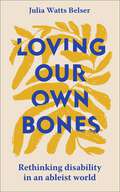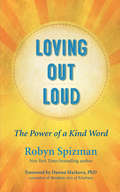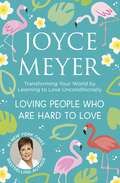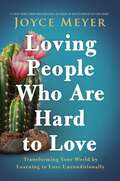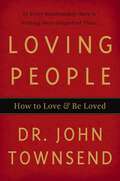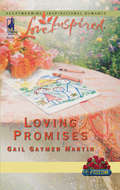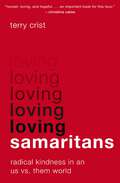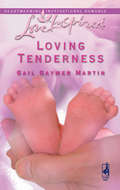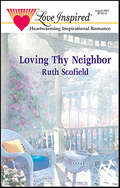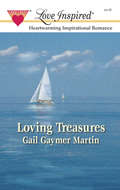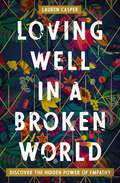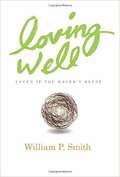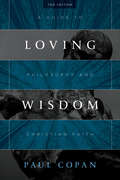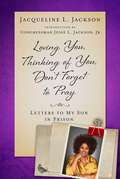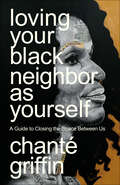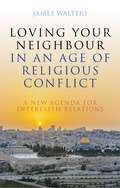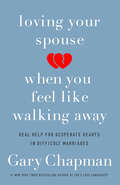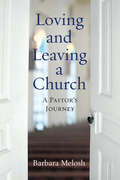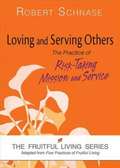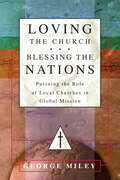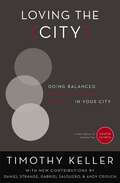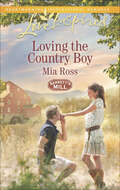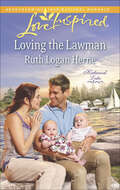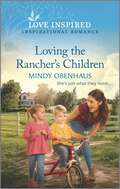- Table View
- List View
Loving Our Own Bones: Rethinking disability in an ableist world
by Julia Watts BelserOpen the Bible, and disability is everywhere. Moses stutters and thinks himself unable to answer God's call. Isaac's blindness lets his wife trick him into bestowing his blessing on his younger son. Jesus heals the sick the blind, the paralyzed, and the possessed. For centuries, these stories have been told and retold by commentators who treat disability as misfortune, as a metaphor for spiritual incapacity, or as a challenge to be overcome.Loving Our Own Bones turns that perspective on its head. Drawing insights from the hard-won wisdom of disabled folks who've forged difference into fierce and luminous cultural dissent, Belser offers fresh and unexpected readings of familiar biblical stories, showing how disability wisdom can guide us all toward a powerful reckoning with the complexities of the flesh. She talks back to biblical commentators who traffic in disability stigma and shame, challenging interpretations that demean disabled people and diminish the vitality of disabled lives. And she shows how Sabbath rest can be a powerful counter to the relentless demand for productivity, an act of spiritual resistance in a culture that makes work the signal measure of our worth.With both a lyrical love of tradition and incisive political analysis, Belser braids spiritual perspectives together with keen activist insights-inviting readers to claim the power and promise of spiritual dissent, to nourish their own souls through the revolutionary art of radical self-love.
Loving Out Loud: The Power of a Kind Word
by Robyn SpizmanLoving Out Loud is a little book with a big message: you have the power to make a positive impact on someone’s day, every day, and it isn’t nearly as hard as you think. Robyn Spizman has spent her career finding ways to make others happy with gifts and actions. Observing how the smallest compliment or remark of appreciation can transform an awkward moment into one of connection and joy, she set out to find words and acts designed to let someone else know we are paying attention, we care, and we appreciate them. With LOL Snapshots and LOL daily suggestions in numerous categories, Loving Out Loud is poised to inspire a movement toward a kinder, more engaged community.
Loving People Who Are Hard to Love: Transforming Your World by Learning to Love Unconditionally
by Joyce MeyerHow do you love the people in your life who are hard to love?We're never going to be able to prevent people from saying or doing things that hurt our feelings. We will always have opportunities to get offended. But if we do things God's way, we can choose to save ourselves a lot of misery and hardship. This doesn't mean we allow people to abuse us. No, there is a time for confronting people and dealing with situations. However, the Bible commands us to love our enemies and forgive those who have wronged us, even when it feels impossible.Everything the Lord asks us to do in the Bible is ultimately for our good. In fact, when we choose to love our enemies and forgive those who have hurt us, we are actually helping ourselves more than anyone else. Because whatever the Lord commands us to do, He is going to give us the power of the Holy Spirit to accomplish it - and that includes loving and being good to difficult people! God's love flowing through us is strong enough to melt even the hardest hearts, so use kindness as a weapon to overcome the meanness in people.
Loving People Who Are Hard to Love: Transforming Your World by Learning to Love Unconditionally
by Joyce MeyerRenowned Bible teacher and #1 New York Times bestselling author Joyce Meyer teaches readers to love the people in their life who are hard to love. We&’re never going to be able to prevent people from saying or doing things that hurt our feelings. We will always have opportunities to get offended. But if we do things God&’s way, we can choose to save ourselves a lot of misery and hardship. This doesn&’t mean we allow people to abuse us. No, there is a time for confronting people and dealing with situations. However, the Bible commands us to love our enemies and forgive those who have wronged us, even when it feels impossible. Everything the Lord asks us to do in the Bible is ultimately for our good. In fact, when we choose to love our enemies and forgive those who have hurt us, we are actually helping ourselves more than anyone else. Because whatever the Lord commands us to do, He is going to give us the power of the Holy Spirit to accomplish it—and that includes loving and being good to difficult people! God&’s love flowing through us is strong enough to melt even the hardest hearts, so use kindness as a weapon to overcome the meanness in people.A Study Guide is also available for purchase.
Loving People: How to Love and Be Loved
by John TownsendYour personal guide to learning how to love. When you say or hear the words "I love you" it can change your life forever. Love is one of God's most important gifts to anyone, yet there are many misunderstandings about how to make love work in our families, friendships, marriages and dating relationships. In Loving People, best-selling author Dr. John Townsend shows you that love can actually be learned, and gives you the steps and tools to become skilled in love. Using his trademark stories and illustrations to flesh out the important principles, Dr. Townsend covers: receiving love connecting love healing love confronting love romantic love surrendering love Through his teaching, readers will discover - and start enjoying - the words, actions, and experiences of authentic love.
Loving Promises
by Gail Gaymer MartinWhen single mom Bev Miller first meets businessman Dale Levin, they have little in common. But as their friendship develops, they are able to face their relationship doubts in order to explore their future happiness together. Original.
Loving Samaritans: Radical Kindness in an Us vs. Them World
by Terry CristYou can live a radically inclusive life without compromising your beliefs or the truth of the gospel.Humanity is more divided now than ever, gridlocked over social issues, race, gender, climate change, immigration, and our responsibility to vulnerable people. How did we get here? And what can we do to build bridges where walls exist?As a pastor committed to building deep relationships with people whose life experiences are different than his own, Terry Crist knows the beauty and challenge of connecting across dividing lines of race, economic status, faith, and much more. And in this book, he shares how you can too.Profoundly weaving the story of Jesus and the Samaritan woman at the well with his own stories and examples from culture today, Terry addresses how we've strayed from the unity God intended and how we can trade judgment for grace, disputes for harmony, apathy for empathy, and hate for love and acceptance. By the end of this book, you will be able to:Identify how you personally see the world and why it mattersRecognize those on the margins who are right around youImitate Jesus's love for all humanity in the interactions you have with othersExtend dignity to those suffering from mental illness, homelessness, and addictionMaintain thriving relationships when family members are on opposing sides of issuesBe an ambassador of reconciliation in your community It doesn't have to be one or the other--you can both love God and love your neighbor.
Loving Tenderness
by Gail Gaymer MartinAfter her car broke down, single mother Hannah Currey was relieved when a caring stranger helped her find refuge. But hotel manager Andrew Somerville was more than just a Good Samaritan. His kindness and gentle attention helped her believe in love again. With a painful secret haunting her, would Hannah be able to return the love this one-in-a-million man so deserved?
Loving Thy Neighbor
by Ruth ScofieldLOVING THY NEIGHBOR...When Quincee Davis moved into a house in order to raise her late sister’s two children, she was less than thrilled to discover that Hamilton Paxton-the judge who had suspended her driver’s license-lived right next door. Their close proximity created immediate tension...which unexpectedly turned into attraction.PROVED A CHANCE TO HEALHamilton had a shameful secret he was keeping from the community. But his growing friendship with neighbor Quincee was lightening his heart-making him feel bolder. Would his mounting love for Quincee help him learn to trust again, and create a complete family all his own?
Loving Treasures
by Gail Gaymer MartinWith her faith in God to guide her, newly widowed Jemma Dupre moves to Loving, Michigan, to start over. There she meets Philip Sommerville, who helps her to find hope, independence and new romance.
Loving Well in a Broken World: Discover the Hidden Power of Empathy
by Lauren CasperHow can we love our neighbors amid so much division and hurt?Loving your neighbor as yourself would be easy if your neighbors were all people you understood, people you agreed with, people like you. But what about playground bullies, colleagues, refugees, online adversaries? They're all our neighbors, and Jesus said to love them. Every one. But how?Lauren Casper believes the key is the lost art of empathy, stepping into other people&’s shoes and asking what if?—what if it were my child? What if it were me? Casper helps us discover how toidentify our blind spots and tune our hearts to the stories around us;seek and extend forgiveness with grace and humility; andengage in diverse and meaningful relationships.Following these steps will enable us to connect in simple but life-altering ways, to respond to conflict with grace, bring about needed change, and shine God&’s unconditional love into a dark world.
Loving Well: (Even If You Haven't Been)
by William P. SmithDistance. Resentment. Avoidance. You want to love your family, neighbors, and coworkers. But all too often something goes wrong, and you find yourself tearing down the relationships you wanted to build. Are you doomed to keep repeating the same relationship mistakes? William P. Smith explains that destructive relationship patterns no longer need to control you. Experiencing God's love will change you, so you can trade your bad relationship habits for real love.
Loving Wisdom: A Guide to Philosophy and Christian Faith
by Paul CopanA guide to Christian philosophy that engages with the biblical storyAs human beings, we all qualify as philosophers, and Paul Copan contends that we take a position of trust (faith) shaped by philosophical stances but also personal heart commitments (worldviews). In this thoroughly revised and expanded second edition of Loving Wisdom, Copan explores philosophy of religion from a distinctively evangelical Christian perspective—biblically grounded, informed by apologetics, and engaging with questions about universal human longings. Copan presents a distinctively and deliberately biblical philosophy of religion in Loving Wisdom,addressing a wide range of topics and questions as they arise in the metanarrative of scripture. He acknowledges the difficulties, mystery, and disagreements in &“religion,&” while attempting to show how the Christian faith does a much more adequate job of responding to a wide range of challenges as well as addressing our deepest human yearnings. With discussion questions for each chapter and an accessible approach, Loving Wisdom is ideal for the classroom or small groups.
Loving You, Thinking of You, Don't Forget to Pray: Letters to My Son in Prison
by Jacqueline L. Jackson Jesse L. Jackson Jr.From a mother, role model, and civil rights veteran, an inspiring gift of love to a child in his darkest hour.Jacqueline Jackson promised her son, Congressman Jesse L. Jackson, Jr., that she would write him every day during his incarceration in federal prison to serve his thirty-month sentence. This book is an inspiring and moving selection of the letters she wrote him. Together, they comprise a powerful act of love—nurturing and ministering to her son's heart, health, and mind and maintaining his essential connection with home. Frank, anecdotal, imbued with faith, and sometimes humorous, they offer intimate details from the family’s daily life, along with news of friends and the community and glimpses of such figures as Nelson Mandela, Winnie Mandela, and Mayor Marion Barry. They also touch eloquently on issues of social justice, politics, and history, as when Mrs. Jackson recalls growing up in Jim Crow Florida, and they reflect the qualities, instilled by her own mother, that made her a role model for much of her life. Ultimately, these letters offer a blueprint for why we have to support our families not just as they elevate but when they fall. This collection is Mrs. Jackson's contribution to healing during a time when our prisons are full and our communities are suffering. She provides the road map for ensuring that the individuals serving sentences understand that prison is where they are, not who they are and for helping them sustain the courage to keep hope alive.
Loving Your Black Neighbor as Yourself: A Guide to Closing the Space Between Us
by Chanté GriffinDiscover a boundless love for your Black Neighbor with this inspiring and actionable guide to moving toward racial healing.&“Griffin&’s work invites us to embark on a transformative journey toward a more inclusive and loving Christian community.&”—J. W. Buck, PhD, author of Everyday ActivismJesus calls you to love your neighbor, and in the fight against racial injustice, that call includes your Black Neighbor: your Black colleagues, the Black congregants at church, the Black family in your neighborhood. Yet maybe you&’re unsure of how best to show your love, or maybe you fear either saying or doing the wrong thing. In Loving Your Black Neighbor as Yourself, Chanté Griffin equips you to see and love your Black Neighbor with God&’s deep, holistic love. Using Black Love Lenses birthed from African American cultural values, you&’ll learn meaningful ways through which you can see and care for your Black Neighbor:• Intimacy: cultivate intentional closeness and community• Honor: show overflowing respect and love• Stand Up: use your voice and influence to advocate• God&’s Gifts: allow God&’s resources to flow through you• The Spirit of Love: love lavishly through intercessory prayersThrough guided readings, prayers, and heart checks, you&’ll undergo a spiritual and relational transformation that grows a deeper love for your Black Neighbor and yourself. Are you ready to answer Jesus&’s call?
Loving Your Neighbour in an Age of Religious Conflict: A New Agenda for Interfaith Relations
by James WaltersThis book offers a fresh perspective on religious difference by setting local challenges within the global picture, and exploring the meaning of religious resurgence for Western secularist ideas. Theory and practical engagement are combined in an imaginative Christian approach to responding to religious difference, without resorting to relativism.
Loving Your Spouse When You Feel Like Walking Away: Real Help for Desperate Hearts in Difficult Marriages
by Gary ChapmanWhat to do when you feel like giving upWhen you said, &“I do,&” you entered marriage with high hopes, dreaming it would be supremely happy. You never intended it to be miserable.Millions of couples are struggling in desperate marriages. But the story doesn&’t have to end there. Dr. Gary Chapman writes, &“I believe that in every troubled marriage, one or both partners can take positive steps that have the potential for changing the emotional climate in their marriage.&”Loving Your Spouse When You Feel Like Walking Away, the revised and updated edition of the award-winning Desparate Marriages, teaches you how to:Recognize and reject the myths that hold you captiveBetter understand your spouse&’s behaviorTake responsibility for your own thoughts, feelings, and actionsMake choices that can have a lasting, positive impact on you and your spouseAn experienced marriage and family counselor, Gary Chapman speaks to those whose spouse is any of the following:IrresponsibleA workaholicControllingUncommunicativeVerbally abusivePhysically abusiveSexually abusiveUnfaithfulAddicted to alcohol or drugsDepressedMarriage has the same potential to be miserable as it does to be blissful. Read Loving Your Spouse When You Feel Like Walking Away to learn how you can turn things around.
Loving Your Spouse When You Feel Like Walking Away: Real Help for Desperate Hearts in Difficult Marriages
by Gary ChapmanWhat to do when you feel like giving upWhen you said, &“I do,&” you entered marriage with high hopes, dreaming it would be supremely happy. You never intended it to be miserable.Millions of couples are struggling in desperate marriages. But the story doesn&’t have to end there. Dr. Gary Chapman writes, &“I believe that in every troubled marriage, one or both partners can take positive steps that have the potential for changing the emotional climate in their marriage.&”Loving Your Spouse When You Feel Like Walking Away, the revised and updated edition of the award-winning Desparate Marriages, teaches you how to:Recognize and reject the myths that hold you captiveBetter understand your spouse&’s behaviorTake responsibility for your own thoughts, feelings, and actionsMake choices that can have a lasting, positive impact on you and your spouseAn experienced marriage and family counselor, Gary Chapman speaks to those whose spouse is any of the following:IrresponsibleA workaholicControllingUncommunicativeVerbally abusivePhysically abusiveSexually abusiveUnfaithfulAddicted to alcohol or drugsDepressedMarriage has the same potential to be miserable as it does to be blissful. Read Loving Your Spouse When You Feel Like Walking Away to learn how you can turn things around.
Loving and Leaving a Church: A Pastor's Journey
by Barbara MeloshBarbara Melosh's story was a common one. A second-career seminarian, she arrived at her first pastorate brimming with enthusiasm and high hopes. The blue-collar congregation to which she'd been called had a glorious past but an uncertain future. Certain that she could turn around its slow yet undeniable slide into decline, Melosh inaugurated a number of church growth and outreach programs. Most of these efforts had little effect, and the ones that did seem to work soon suffered reverse outcomes and eventual demise. In the end, Melosh had to conclude that the members of the congregation liked their church the way it was and that she could not drag them into a future they did not want. <P><P> Yet while the congregation failed to change itself, Melosh notes, it succeeded in changing her. Simply put, it made her a pastor. At times heartbreaking and hilarious, Loving and Leaving a Church offers a glimpse into the challenges and opportunities of ministry in a mainline church.
Loving and Serving Others: The Practice of Risk-Taking Mission and Service (The Fruitful Living Series)
by Robert SchnaseSince the publication of Five Practices of Fruitful Congregations, these five practices have helped hundreds of congregations understand their mission, renew ministries, and stretch toward fruitfulness and excellence for the purpose of Christ. Now, each of the five practices has been broken out into 4-week small group studies that provide an honest, practical, and winsome guide to the spiritual journey. Loving and Serving Others: The Practice of Risk-Taking Mission and Service involves offering ourselves in purposeful service to others in need, making a positive difference even at significant personal cost and inconvenience to our own lives. We serve.
Loving the Church . . . Blessing the Nations: Pursuing the Role of Local Churches in Global Mission
by George MileyRediscovering the role God designed for the church in mission is a critical issue facing the missions movement today. That role is to glorify God by planting churches among every tongue, tribe, and nation. Planting churches amid unreached peoples is a complex process. It calls forth every ministry gift and the contribution of every believer. Imagine a businessman, a construction worker, a schoolteacher, and an engineer all working together to support the development of a local church amongst an unreached people group in another part of the world. Most Christians will not leave home and go elsewhere to minister. If they are to participate in God's global mission, they must be affirmed, developed and released right where they live, in the context of their local church. This book shows how churches can become centers of mission vision and implementation and so accomplish God's design for the local church.
Loving the City: Doing Balanced, Gospel-Centered Ministry in Your City (Center Church)
by Timothy KellerEven if you don&’t go to the city to minister, make no mistake—the city is coming to you. Regardless of your particular cultural or geographical context, you will need to consider the city when forming a theological vision that engages the people you are trying to reach.In Loving the City, bestselling author and pastor Timothy Keller looks at the biblical foundations for contextualizing the gospel as we communicate to the culture in a way that is both respectful and challenging. He articulates the key characteristics of a city vision, showing how the city develops as a theme throughout Scripture, from its anti-God origins, to its strategic importance for mission, to its culmination and redemption in glory.Finally, he examines the need for thoughtful cultural engagement, unpacking four models for engaging culture, showing the strengths and weaknesses of each approach and emphasizing a blended approach that balances the key insights of each. Loving the City will help you to minister to your cultural context in a way that is biblically faithful and fruitful.This new edition contains the second section of Center Church in an easy-to-read format with new reflections and additional essays from Timothy Keller and several other contributors.
Loving the Country Boy: Rancher Daddy Loving The Country Boy A Father's Second Chance (Barrett's Mill #4)
by Mia RossA City Girl's Second Chance City girl Tess Barrett hopes her move to Barrett's Mill, Virginia, will give her a fresh start. As she gets to know the family she's never met and begins work at their sawmill, everything starts falling into place. Until she meets Heath Weatherby. After narrowly escaping an oil rig explosion, Heath won't waste his second chance at life. He's committed to starting a family-and he wants Tess for his wife. Tess refuses to give in to her feelings for Heath, convinced they're just too different. But when the rugged mechanic is hired to fix her family's mill, her heart begins to recognize the charming country boy as her one true love.
Loving the Lawman: Sugarplum Homecoming Amish Christmas Joy The Lawman's Holiday Wish (Kirkwood Lake #4)
by Ruth Logan HerneSafe in His Arms Widowed and pregnant, Gianna Costanza comes to Kirkwood Lake with her world in pieces. She's determined to put her life back together after her cop husband's death, and romance definitely isn't part of the plan. But when she meets her new landlord and neighbor, she knows she doesn't stand a chance. Deputy Sheriff Seth Campbell is strong and kind, and more supportive than she ever imagined a man could be. Soon he's sweeping Gianna off her feet. But she doesn't know if he's ready for an instant family-or if she's brave enough to love another lawman.
Loving the Rancher's Children: An Uplifting Inspirational Romance (Hope Crossing #3)
by Mindy ObenhausA short-term solution Could lead to long-term loveWhen Alli Krenek returns to her hometown, she&’s surprised to find herself agreeing to become a nanny to Jake Walker&’s children. Seventeen years ago, Jake betrayed Alli&’s trust, and she&’s avoided him ever since. But the more time she spends with Jake, the more his two little ones melt her heart and Alli begins to see the man Jake has become. Is this their chance to finally heal old wounds?From Love Inspired: Uplifting stories of faith, forgiveness and hope.Hope Crossing Book 1: The Cowgirl's RedemptionBook 2: A Christmas BargainBook 3: Loving the Rancher's Children
